Editorial: No, the new 2019 Mac Pro isn't a fairy tale come true
After years of frustratedly waiting in the dark and suffering through some painful periods of construction work, the new 2019 Mac Pro appears to finally deliver above and beyond what even the most optimistic had hoped for. But its appearance wasn't merely a whimsical executive decision made in response to a customer email, and is instead the latest deliverable of a long term strategy unfolding at Apple.
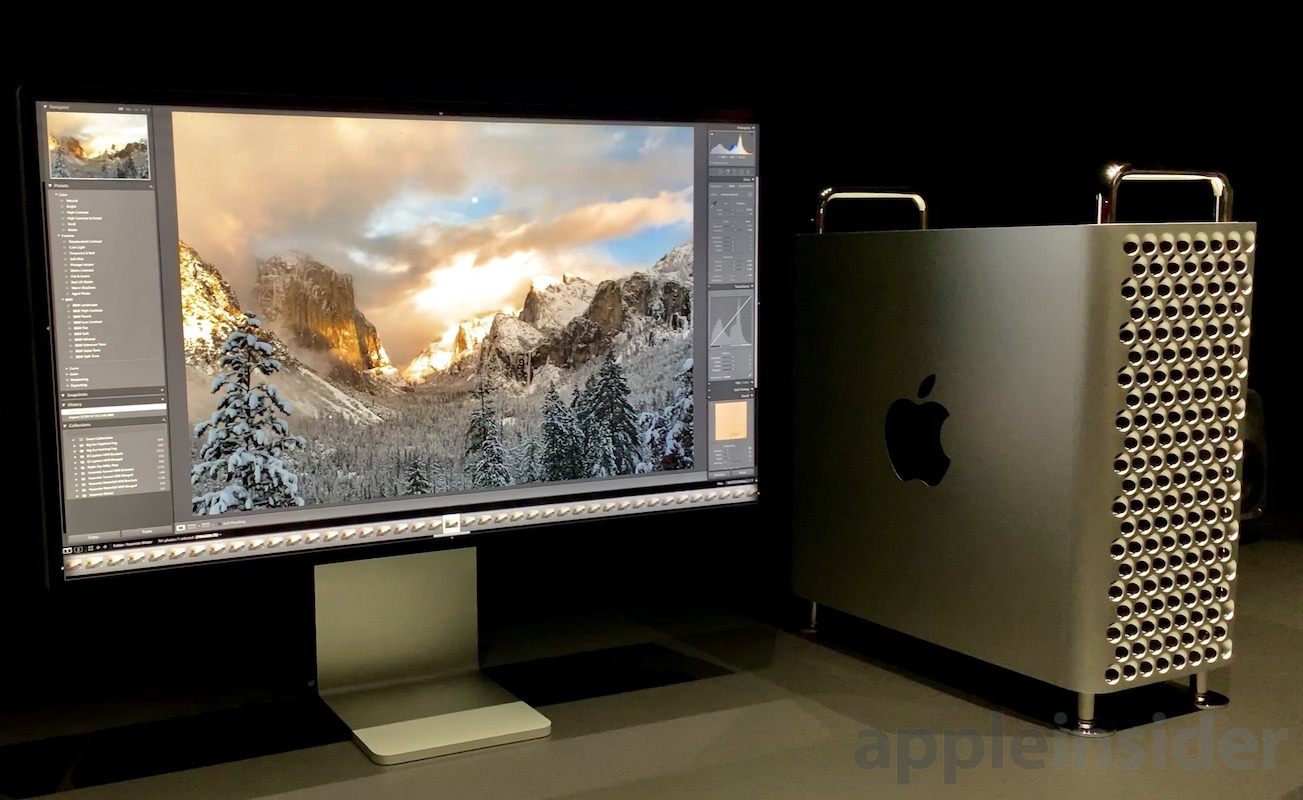
Mac Pro 2019
Writing opinions on the web requires zero expertise and no real understanding of how anything in the real world works. So let me factually take apart for you three obstructing fallacies that will help solve the mystery of why Apple has dramatically changed its computing product strategy, moving from the two former computing tiers of the last decade-- the under $1,500 mass market for iOS devices and a $1,000 to $5,000 market for prosumer Macs-- to now include a third, wholly unique new tier occupied by the $6,000 to $25,000 Mac Pro workstation.
Apple's executive committee doesn't form its strategic direction for products from emails and blog postings or the public comments that get posted on them.
There are a lot of Mac fans who like to dream up new product categories and then advocate that Apple should go out and build this new thing, whether its the "headless Mac," some sort of personal home media server, or a laptop with a display that detaches into a tablet which then maybe folds up into a smartphone. Many seem to think that If only they could get an audience with Cook, their idea could be the next big thing everyone wants.
I personally love to speculate about where Apple is moving. Back in 2004, I suspected Apple would turn its igloo flat-panel iMac into a design that moved the system into the display panel. In 2006 I anticipated that it would turn its iPod into a full touchscreen mobile right before it did. Sketching up mockups is easy! There's vastly more work in actually developing an idea into completion and finding a market for it.

It was easy to mock up an iPhone. It took massive work to actually deliver it
Many of the ideas I've anticipated took far longer than I expected to arrive. I predicted Apple would use Apple TV to deliver apps and games long before tvOS, and that it would begin funding its original content a very long time ago. I anticipated that Apple would integrate an iOS device into its MacBooks as a secondary touchscreen display as a way to differentiate its laptops from PCs well before it shipped Touch Bar.
I expected Apple to add Siri functionality and wireless surround capabilities to its Beats speakers years before it did. Again, an inventive idea was effortless to think up, while lining up all the strategies required to deliver off a major product or service took years of work.
Before iPhone shipped, I once suggested to Steve Jobs at a shareholder meeting that Apple could make its macOS platform more attractive in emerging countries by making earlier versions of it available as a free download, back in the days when retail Mac OS X upgrades sold for $129. But I'm certain that my "idea" wasn't really the reason Apple shifted billions in revenue to set out on a plan moving the development costs of its OS into deferred revenue earned from hardware sales of devices.
That's because, while the nugget of one's ideas may seem to be genius, the actual implementation of any idea requires thousands of much more sophisticated and specialized ideas to actually make it happen. Apple is not fueled by "smart inventions." It is successful because it puts incredible work and thought into competently implementing long term strategies.
The simple concept of "not charging for major OS updates," for example, actually required real work to comply with SEC regulations on deferred earnings, and materially changed Apple's financial results, hiding billions of dollars on income from investors who didn't consider this change. I'm not an accountant, so it had never even occurred to me that any of that would be required.
Also, Apple shifted new updates of iOS and later macOS to be free at launch, not just offering a free download of older versions for poor people. If Apple had simply rushed out and implemented my idea as stated, it would have created a big new problem by pushing many users to sit on an old, free version of its platforms.
Keeping users up-to-date on its latest platforms turned out to be obviously important in hindsight, but its something that nobody recognized the significance of at the time. While I described the emerging problem of Google's inability to keep its install base of Android users current as a real problem back in 2011, virtually everyone in Androidland asserted that it was really no big deal across most of the last decade. The Verge is just now accepting that it is a big deal, a bad problem that's getting worse, and a major factor in the aftermarket valuation, security profile, and usable device lifespan of Android devices.

The Android OS has always been free, so it wasn't me standing at a podium microphone in front of Jobs that upended the revenue structure of OS software at Apple over the last 15 years. It wasn't merely the idea of "free downloads" that was powerful in making Apple's OS platforms popular, trusted, and and valuable, resulting in massive installed base of cohesive users that are nearly all using the freshest API versions, and all primed to drive future growth in Services as, in Oprah's words, that "billion pockets, y'all."
All of that wasn't based on a simple whim of invention; It was the ongoing work by coordinated teams of people across wildly different skill sets, all working to develop and then implement a multifaceted, ongoing strategy seeking to maximize shareholder value while working in the best interests of its customers.
That might sound like every corporation, but Apple achieved its current results in pushing free updates in plain view. In contrast, Google offers several free OS platforms that have so little real value that Apple couldn't even be bothered to sue it for patent infringement.
Across the same decade, Google hasn't been able to deliver a cohesive, updated platform of users globally, despite many efforts to push its licensee to do this and to crush any competitive threat of forking Android among its partners. It also has no commercial presence in China, the largest mobile market in the world. Even domestically, Google's Android isn't fueling massive new growth in Services and has no real prospect of really building out original subscription content as Apple is. The difference isn't based on an "inventive idea," but rather the competency of the development and implementation of a strategy.
Similarly, while Apple began giving away its software updates to its hardware buyers, Microsoft continued to charge licensees for Windows Mobile until that platform died on the vine. It has since scrambled to shift around its platform licensing for Windows 10 and Office, effectively losing control of platforms that were once monopolies.
Today, it doesn't serve a global installed base of mobile users and materially participate in a software ecosystem like the App Store. Instead, it sits in the App Store, sharing its revenues with Apple, because Apple competently developed and implemented a strategy that Microsoft didn't-- even though the idea of a Palladium App Store was actually Microsoft's to begin with. Again, Apple's success is not fueled by smart inventions. It is successful because it puts incredible work and thought into competently implementing long term strategies.
Everything the modern Apple does is backed up by massive, overwhelming data, and is part of a long term strategy. That doesn't mean everything it does is perfect, accurate, unassailable, or even popular among all of its customers. But it does mean that Apple doesn't decide on what to do next by pulling ideas out of a hat or asking members of a focus group. Instead, we know that Apple works in the opposite direction, developing work on lots of ideas, most of which are rejected with a No. That is materially different from companies such as Amazon or Samsung, which do not appear to even have "no" in their vocabulary.
Apple's implementation of strategy is also unique in that it rarely makes wild, random shifts in direction. Compare Apple's iPad with Android tablets. Google tried expensive Honeycomb tablets, then very cheap Nexus ones, then expensive Pixel tablets, then tried a new OS, then gave up on tablets entirely, all across the same decade where Apple methodically built up a separate tablet-optimized iOS app market, incrementally expanded both up and downward in price, and then only after a decade of establishing itself as a unique flavor of iOS did it rebrand as iPadOS. It has ended up commercially dominating tablets around the entire world.
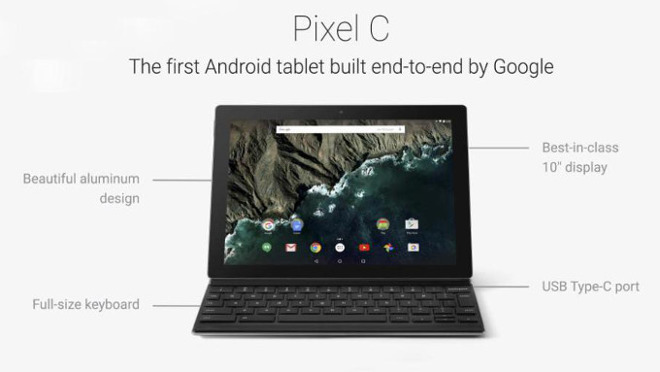
Google didn't have an invention problem. It had an implementation problem
Nearly every major analyst and industry observer predicted the final outcome of tablets incorrectly, based largely on bad and misleading data on tablet unit shipments. And nearly every blogger and newspaper columnist nodded along with IDC and Strategy Analytics in agreeing that iPad couldn't possibly hope to ever matter too much commercially in a world overrun with $30 Android tablets. Yet today, it's pretty clear in hindsight that in terms of tablet strategy, iOS and Android played the roles of a fox and a bunch of headless chickens, respectively.
The very same results have also played out in notebooks, watches, earbuds, and, I believe, will happen in speakers. That's still a minority opinion, but if you incrementally turn back the clock, I also held a minority opinion related to Apple's prospects in wireless headphones, in watches, notebooks, tablets, phones, iPods and a very long time ago, with the Mac and macOS X. If you look back at the public comments on my old articles or the names of analysts and journalists who have blocked me on Twitter, you'll find two decades of almost unanimous agreement that Apple was doomed at every step on the way to its current trillion-dollar market valuation.
Microsoft has similarly played the headless chicken in its efforts to copy Apple's foxy iPod, iPhone, iPad, MacBooks, Apple Watch and most recently, AirPods. And yet, despite a decade of clearly observable data, journalists are almost unanimous in praising every wild, random, and brainlessly desperate new strategy by the headless chickens while each time also expecting that the fox is going to lose this time-- it's obviously outnumbered!
In 2010, shortly after iPad launched, Microsoft drew up an concept image of two iPads hinged together (below) and called it "Courier." This concept attracted swooning attention from across the tech media that was markedly different from the brutal original reaction to Apple's actual iPad.
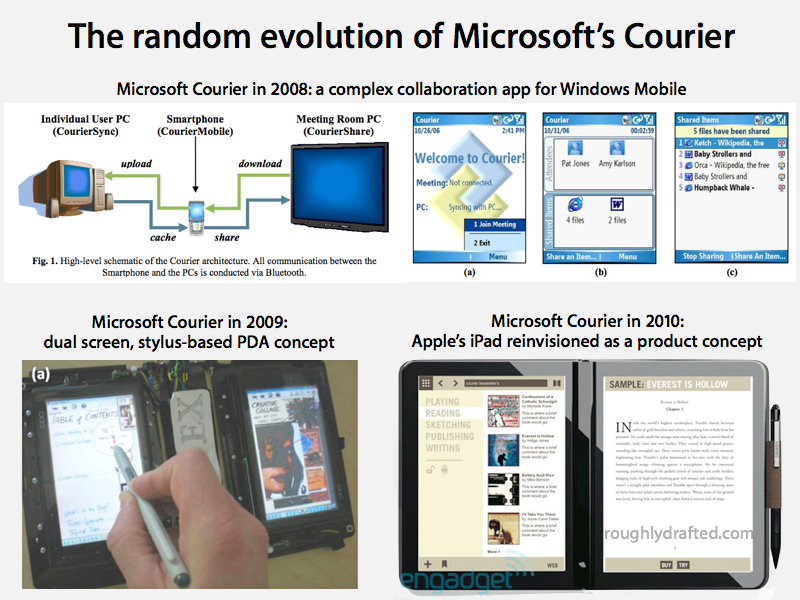
Microsoft's phony mockup of two iPads drew more applause from the tech media than the real iPad
It didn't matter to tech bloggers and even journalists that Courier wasn't even a real prototype, didn't have any price tag, or any actual details worked out about how it would work or what software it might run. They were enthralled by a picture that took little more effort than my "invention" of the iPhone in 2006. Courier was an effort to distract away from the reality that Apple had its iPad ready to sell, and Microsoft and all of its partners from HP to Samsung had Windows tablets that were thick, expensive, and ridiculous in comparison.
Fast forward ten years and Apple has sold 360 million iPads, while Microsoft has flopped around offering various ideas for netbooks, detachable notebook screens, expensive and cheap tablets, none of which have found a real audience or grown beyond a vanity level product hobby. This year, it floated another prototype that won't enter production for at least a year and has no price tag. This received cheers and applause from the same people who got excited about Courier the first time, even nostalgically recalling the name of vaporware from the last time Microsoft had played them as fools. Unbelievable.
Also, think of every major industry consortium that ever "took on" Apple, from Ultraviolet to Miracast to CurrentC. Tech journalists can't help but prop up each one as the next thing that's going to destroy Apple.
Apple's rivals regularly erect what purport to be deep, strategic projects that are almost always taken very seriously by the tech media. Then, frequently within a few months or years, those initiatives are abandoned and nothing is ever said about them again. Many were executive whims, from Jeff Bezos's Amazon Fire Phone, to Satya Nadella's Microsoft Devices, to Andy Rubin's Google TV and robots, to DJ Koh's Samsung Galaxy Fold.
Members of the tech media bent over backward to avoid being too critical of these ideas even as each embarrassingly billowed the smoke of failure like dumpsters set ablaze. Journalists are still optimistically waiting to see what revision of the Fold will allow it to live more than two days, allowing Samsung as much time as it needs to fix a product that is fantastically stupid even at a conceptual level, without regard for its insane price.
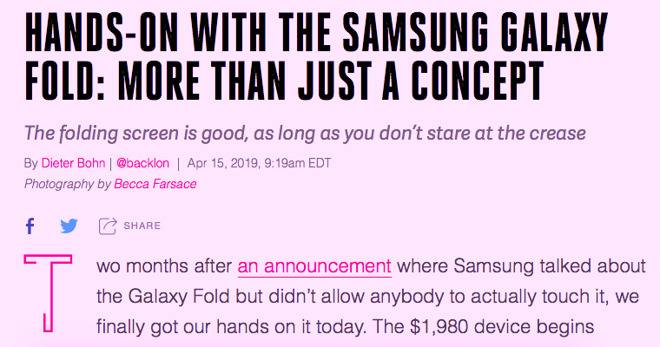
This review held up about as well as the device itself
Conversely, Apple has rolled out ideas that were depicted at launch as grievous mistakes that were poorly thought out, perhaps a dumb-pet project of some dad-executive unhip to the reality of what the kids are into these days. Siri's OS-level voice assistant, Force Touch, Apple Watch, dual depth cameras, Touch Bar, AirPods, and Face ID were all dismissed as shallow distractions of little value that "couldn't move the needle"; Siri was even greeted at launch by top executives of Microsoft and Google as being totally the wrong direction for phones, several years before they scrambled to create their own.
Yet Apple keeps incrementally investing into all of these as part of an evolving strategy unfolding in major new features that sell its products, regardless of whether or not they appear to be used a lot by the majority of customers. Sometimes a strategic move ends up powering something else entirely, as Touch Bar has in Catalina's new Sidecar feature. Apple expends lots of energy into studying ideas before it ships them. Conversely, that means if Apple ships something, it's important enough to have invested lots of thought and effort into it.
On the new Mac Pro, it's pretty clear Apple has a strong strategic intent causing it to ship such a very expensive machine that will apparently have a relatively limited addressable audience. By the same token, that also means that there are all manner of other potential niche Macs that Apple is purposely not shipping because they would not strategically advance any goal. So the appearance of Mac Pro is not evidence that other "wishlist Macs" are similarly in the pipeline, such as a scaled-down version speculatively aimed at "pro-ish" consumers, or one aimed at gamers, or crypto miners, and so on.
That principle also applies in other areas, explaining why we haven't seen a cheaper HomePod or a very small new iPhone. Market opportunities and product strategies don't infinitely scale up and down, even if Samsung's tablet offerings might make it look that way. The truth is, Samsung doesn't really have a tablet strategy. It just has lots of people working on products and inventions without much thoughtful strategic direction at all.
Note too that Apple isn't always successful in implementing a given strategy. Sometimes no matter how much you try, there just isn't an audience. Back in 2002 Jobs' Apple put significant effort into building Xserve, a rack-mounted server that simply never found a niche capable of sustaining it as a product. After it was laid to rest in 2006 [correction: 2010, the last Xserve update occurred in 2009], Apple subsequently trended away from making any Mac server hardware specifically designed for rack mounting.
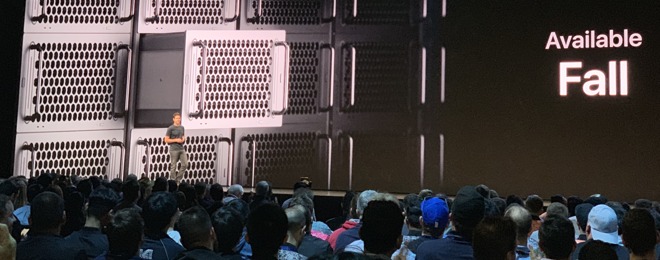
Apple is returning to the rack mounted server space
A lot has changed since 2009, however, and now in 2019, the new Mac Pro is returning in a custom bespoke version designed to slide into a server rack. Apple wouldn't answer many of my questions about the rack-mounted version of the Mac Pro back at WWDC19, saying only that more details would be released later in the year.
Pretty clearly, the decision to return to server closets wasn't a whim floated by Cook or sparked by a customer email. It was part of a careful examination of a shifting market and the ongoing development of technologies within Apple. The following segment considers how Apple builds its products and its relationship with China.

Mac Pro 2019
Writing opinions on the web requires zero expertise and no real understanding of how anything in the real world works. So let me factually take apart for you three obstructing fallacies that will help solve the mystery of why Apple has dramatically changed its computing product strategy, moving from the two former computing tiers of the last decade-- the under $1,500 mass market for iOS devices and a $1,000 to $5,000 market for prosumer Macs-- to now include a third, wholly unique new tier occupied by the $6,000 to $25,000 Mac Pro workstation.
The flawgic of Tim Cook's executive whims of invention
First, let me destroy the idea that Apple makes its multibillion-dollar product decisions largely on an executive whim. Apple's executives do listen to feedback from customers; Apple's chief executive Tim Cook in particular likes to talk to investors about the importance of "customer sat," or making products that will "delight" users. That requires addressing the features buyers want and need, which requires listening to them.Apple's executive committee doesn't form its strategic direction for products from emails and blog postings or the public comments that get posted on them.
There are a lot of Mac fans who like to dream up new product categories and then advocate that Apple should go out and build this new thing, whether its the "headless Mac," some sort of personal home media server, or a laptop with a display that detaches into a tablet which then maybe folds up into a smartphone. Many seem to think that If only they could get an audience with Cook, their idea could be the next big thing everyone wants.
I personally love to speculate about where Apple is moving. Back in 2004, I suspected Apple would turn its igloo flat-panel iMac into a design that moved the system into the display panel. In 2006 I anticipated that it would turn its iPod into a full touchscreen mobile right before it did. Sketching up mockups is easy! There's vastly more work in actually developing an idea into completion and finding a market for it.

It was easy to mock up an iPhone. It took massive work to actually deliver it
Many of the ideas I've anticipated took far longer than I expected to arrive. I predicted Apple would use Apple TV to deliver apps and games long before tvOS, and that it would begin funding its original content a very long time ago. I anticipated that Apple would integrate an iOS device into its MacBooks as a secondary touchscreen display as a way to differentiate its laptops from PCs well before it shipped Touch Bar.
I expected Apple to add Siri functionality and wireless surround capabilities to its Beats speakers years before it did. Again, an inventive idea was effortless to think up, while lining up all the strategies required to deliver off a major product or service took years of work.
Before iPhone shipped, I once suggested to Steve Jobs at a shareholder meeting that Apple could make its macOS platform more attractive in emerging countries by making earlier versions of it available as a free download, back in the days when retail Mac OS X upgrades sold for $129. But I'm certain that my "idea" wasn't really the reason Apple shifted billions in revenue to set out on a plan moving the development costs of its OS into deferred revenue earned from hardware sales of devices.
That's because, while the nugget of one's ideas may seem to be genius, the actual implementation of any idea requires thousands of much more sophisticated and specialized ideas to actually make it happen. Apple is not fueled by "smart inventions." It is successful because it puts incredible work and thought into competently implementing long term strategies.
The simple concept of "not charging for major OS updates," for example, actually required real work to comply with SEC regulations on deferred earnings, and materially changed Apple's financial results, hiding billions of dollars on income from investors who didn't consider this change. I'm not an accountant, so it had never even occurred to me that any of that would be required.
Also, Apple shifted new updates of iOS and later macOS to be free at launch, not just offering a free download of older versions for poor people. If Apple had simply rushed out and implemented my idea as stated, it would have created a big new problem by pushing many users to sit on an old, free version of its platforms.
Keeping users up-to-date on its latest platforms turned out to be obviously important in hindsight, but its something that nobody recognized the significance of at the time. While I described the emerging problem of Google's inability to keep its install base of Android users current as a real problem back in 2011, virtually everyone in Androidland asserted that it was really no big deal across most of the last decade. The Verge is just now accepting that it is a big deal, a bad problem that's getting worse, and a major factor in the aftermarket valuation, security profile, and usable device lifespan of Android devices.

The Android OS has always been free, so it wasn't me standing at a podium microphone in front of Jobs that upended the revenue structure of OS software at Apple over the last 15 years. It wasn't merely the idea of "free downloads" that was powerful in making Apple's OS platforms popular, trusted, and and valuable, resulting in massive installed base of cohesive users that are nearly all using the freshest API versions, and all primed to drive future growth in Services as, in Oprah's words, that "billion pockets, y'all."
All of that wasn't based on a simple whim of invention; It was the ongoing work by coordinated teams of people across wildly different skill sets, all working to develop and then implement a multifaceted, ongoing strategy seeking to maximize shareholder value while working in the best interests of its customers.
That might sound like every corporation, but Apple achieved its current results in pushing free updates in plain view. In contrast, Google offers several free OS platforms that have so little real value that Apple couldn't even be bothered to sue it for patent infringement.
Across the same decade, Google hasn't been able to deliver a cohesive, updated platform of users globally, despite many efforts to push its licensee to do this and to crush any competitive threat of forking Android among its partners. It also has no commercial presence in China, the largest mobile market in the world. Even domestically, Google's Android isn't fueling massive new growth in Services and has no real prospect of really building out original subscription content as Apple is. The difference isn't based on an "inventive idea," but rather the competency of the development and implementation of a strategy.
Similarly, while Apple began giving away its software updates to its hardware buyers, Microsoft continued to charge licensees for Windows Mobile until that platform died on the vine. It has since scrambled to shift around its platform licensing for Windows 10 and Office, effectively losing control of platforms that were once monopolies.
Today, it doesn't serve a global installed base of mobile users and materially participate in a software ecosystem like the App Store. Instead, it sits in the App Store, sharing its revenues with Apple, because Apple competently developed and implemented a strategy that Microsoft didn't-- even though the idea of a Palladium App Store was actually Microsoft's to begin with. Again, Apple's success is not fueled by smart inventions. It is successful because it puts incredible work and thought into competently implementing long term strategies.
Everything the modern Apple does is backed up by massive, overwhelming data, and is part of a long term strategy. That doesn't mean everything it does is perfect, accurate, unassailable, or even popular among all of its customers. But it does mean that Apple doesn't decide on what to do next by pulling ideas out of a hat or asking members of a focus group. Instead, we know that Apple works in the opposite direction, developing work on lots of ideas, most of which are rejected with a No. That is materially different from companies such as Amazon or Samsung, which do not appear to even have "no" in their vocabulary.
Apple's implementation of strategy is also unique in that it rarely makes wild, random shifts in direction. Compare Apple's iPad with Android tablets. Google tried expensive Honeycomb tablets, then very cheap Nexus ones, then expensive Pixel tablets, then tried a new OS, then gave up on tablets entirely, all across the same decade where Apple methodically built up a separate tablet-optimized iOS app market, incrementally expanded both up and downward in price, and then only after a decade of establishing itself as a unique flavor of iOS did it rebrand as iPadOS. It has ended up commercially dominating tablets around the entire world.
Google didn't have an invention problem. It had an implementation problem
Nearly every major analyst and industry observer predicted the final outcome of tablets incorrectly, based largely on bad and misleading data on tablet unit shipments. And nearly every blogger and newspaper columnist nodded along with IDC and Strategy Analytics in agreeing that iPad couldn't possibly hope to ever matter too much commercially in a world overrun with $30 Android tablets. Yet today, it's pretty clear in hindsight that in terms of tablet strategy, iOS and Android played the roles of a fox and a bunch of headless chickens, respectively.
The very same results have also played out in notebooks, watches, earbuds, and, I believe, will happen in speakers. That's still a minority opinion, but if you incrementally turn back the clock, I also held a minority opinion related to Apple's prospects in wireless headphones, in watches, notebooks, tablets, phones, iPods and a very long time ago, with the Mac and macOS X. If you look back at the public comments on my old articles or the names of analysts and journalists who have blocked me on Twitter, you'll find two decades of almost unanimous agreement that Apple was doomed at every step on the way to its current trillion-dollar market valuation.
Microsoft has similarly played the headless chicken in its efforts to copy Apple's foxy iPod, iPhone, iPad, MacBooks, Apple Watch and most recently, AirPods. And yet, despite a decade of clearly observable data, journalists are almost unanimous in praising every wild, random, and brainlessly desperate new strategy by the headless chickens while each time also expecting that the fox is going to lose this time-- it's obviously outnumbered!
In 2010, shortly after iPad launched, Microsoft drew up an concept image of two iPads hinged together (below) and called it "Courier." This concept attracted swooning attention from across the tech media that was markedly different from the brutal original reaction to Apple's actual iPad.

Microsoft's phony mockup of two iPads drew more applause from the tech media than the real iPad
It didn't matter to tech bloggers and even journalists that Courier wasn't even a real prototype, didn't have any price tag, or any actual details worked out about how it would work or what software it might run. They were enthralled by a picture that took little more effort than my "invention" of the iPhone in 2006. Courier was an effort to distract away from the reality that Apple had its iPad ready to sell, and Microsoft and all of its partners from HP to Samsung had Windows tablets that were thick, expensive, and ridiculous in comparison.
Fast forward ten years and Apple has sold 360 million iPads, while Microsoft has flopped around offering various ideas for netbooks, detachable notebook screens, expensive and cheap tablets, none of which have found a real audience or grown beyond a vanity level product hobby. This year, it floated another prototype that won't enter production for at least a year and has no price tag. This received cheers and applause from the same people who got excited about Courier the first time, even nostalgically recalling the name of vaporware from the last time Microsoft had played them as fools. Unbelievable.
Also, think of every major industry consortium that ever "took on" Apple, from Ultraviolet to Miracast to CurrentC. Tech journalists can't help but prop up each one as the next thing that's going to destroy Apple.
Apple's rivals regularly erect what purport to be deep, strategic projects that are almost always taken very seriously by the tech media. Then, frequently within a few months or years, those initiatives are abandoned and nothing is ever said about them again. Many were executive whims, from Jeff Bezos's Amazon Fire Phone, to Satya Nadella's Microsoft Devices, to Andy Rubin's Google TV and robots, to DJ Koh's Samsung Galaxy Fold.
Members of the tech media bent over backward to avoid being too critical of these ideas even as each embarrassingly billowed the smoke of failure like dumpsters set ablaze. Journalists are still optimistically waiting to see what revision of the Fold will allow it to live more than two days, allowing Samsung as much time as it needs to fix a product that is fantastically stupid even at a conceptual level, without regard for its insane price.

This review held up about as well as the device itself
Conversely, Apple has rolled out ideas that were depicted at launch as grievous mistakes that were poorly thought out, perhaps a dumb-pet project of some dad-executive unhip to the reality of what the kids are into these days. Siri's OS-level voice assistant, Force Touch, Apple Watch, dual depth cameras, Touch Bar, AirPods, and Face ID were all dismissed as shallow distractions of little value that "couldn't move the needle"; Siri was even greeted at launch by top executives of Microsoft and Google as being totally the wrong direction for phones, several years before they scrambled to create their own.
Yet Apple keeps incrementally investing into all of these as part of an evolving strategy unfolding in major new features that sell its products, regardless of whether or not they appear to be used a lot by the majority of customers. Sometimes a strategic move ends up powering something else entirely, as Touch Bar has in Catalina's new Sidecar feature. Apple expends lots of energy into studying ideas before it ships them. Conversely, that means if Apple ships something, it's important enough to have invested lots of thought and effort into it.
On the new Mac Pro, it's pretty clear Apple has a strong strategic intent causing it to ship such a very expensive machine that will apparently have a relatively limited addressable audience. By the same token, that also means that there are all manner of other potential niche Macs that Apple is purposely not shipping because they would not strategically advance any goal. So the appearance of Mac Pro is not evidence that other "wishlist Macs" are similarly in the pipeline, such as a scaled-down version speculatively aimed at "pro-ish" consumers, or one aimed at gamers, or crypto miners, and so on.
That principle also applies in other areas, explaining why we haven't seen a cheaper HomePod or a very small new iPhone. Market opportunities and product strategies don't infinitely scale up and down, even if Samsung's tablet offerings might make it look that way. The truth is, Samsung doesn't really have a tablet strategy. It just has lots of people working on products and inventions without much thoughtful strategic direction at all.
Note too that Apple isn't always successful in implementing a given strategy. Sometimes no matter how much you try, there just isn't an audience. Back in 2002 Jobs' Apple put significant effort into building Xserve, a rack-mounted server that simply never found a niche capable of sustaining it as a product. After it was laid to rest in 2006 [correction: 2010, the last Xserve update occurred in 2009], Apple subsequently trended away from making any Mac server hardware specifically designed for rack mounting.

Apple is returning to the rack mounted server space
A lot has changed since 2009, however, and now in 2019, the new Mac Pro is returning in a custom bespoke version designed to slide into a server rack. Apple wouldn't answer many of my questions about the rack-mounted version of the Mac Pro back at WWDC19, saying only that more details would be released later in the year.
Pretty clearly, the decision to return to server closets wasn't a whim floated by Cook or sparked by a customer email. It was part of a careful examination of a shifting market and the ongoing development of technologies within Apple. The following segment considers how Apple builds its products and its relationship with China.


Comments
Hopefully it will at least get a nice dinner before you have your way with it.
Oh, and China sucks. Support Hong Kong demonstrators!
...how much clearer do they have to be?
it didn’t work out too well, hence the beginnings of a reverse course, starting in the design studio a couple of years ago, now starting to bear fruit.